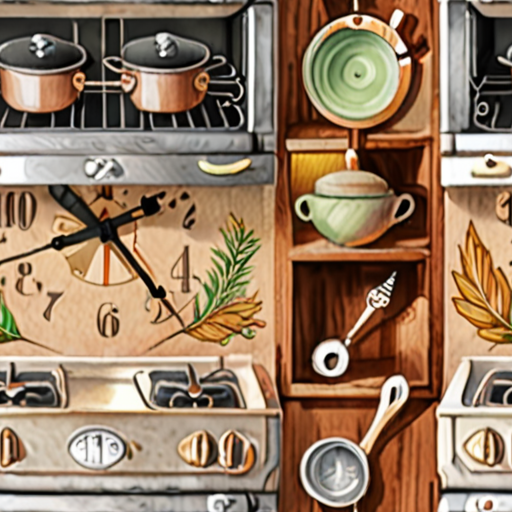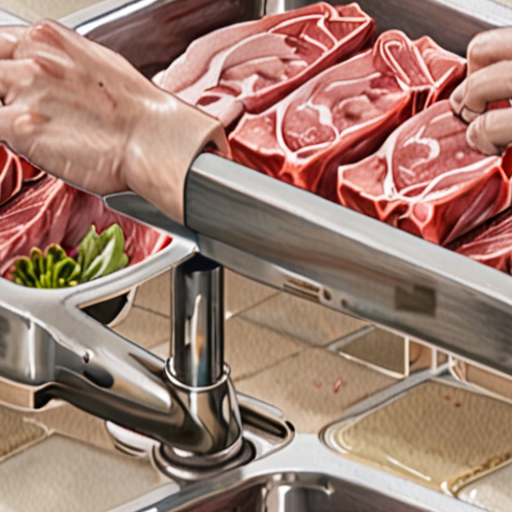As we spend more time in our kitchens, it’s essential to prioritize kitchen safety tips to prevent accidents, injuries, and foodborne illnesses. With millions of people cooking every day, the risk of kitchen-related hazards is ever-present, making it crucial to master the art of safe cooking and food handling. From preventing common hazards like electrical outlet safety and sharp object storage to understanding personal protective equipment and safe food handling practices, there are numerous kitchen safety tips that can help you navigate your way through even the most complex recipes. Whether you’re a seasoned chef or a culinary novice, staying informed about kitchen safety best practices can save you from potential disasters and ensure a healthy and enjoyable cooking experience.

10 Essential Safety Tips
We take pride in prioritizing our customers’ well-being and safety at Memories Restaurant. To ensure a secure dining experience, we’ve compiled a list of essential safety tips that everyone can benefit from.
- Be Aware of Your Surroundings: Keep an eye out for potential hazards such as slippery floors, sharp objects, and electrical cords. Report any concerns to our staff immediately.
- Keep Valuables Secure: Never leave your belongings unattended, and keep your valuables close to prevent loss or theft.
- Follow Basic Hygiene Practices: Wash your hands frequently, cover your mouth when coughing or sneezing, and avoid touching your face to minimize the risk of illness transmission.
- Respect Emergency Procedures: Familiarize yourself with our emergency exit routes, fire extinguishers, and first aid kits. In case of an emergency, stay calm and follow the instructions of our trained staff.
- Stay Connected: Make sure your phone is fully charged and easily accessible in case of an emergency. Inform a friend or family member of your whereabouts and estimated return time.
- Be Mindful of Your Health: If you have any medical conditions or allergies, inform our staff beforehand. We’ll do our best to accommodate your needs and ensure your comfort during your visit.
- Watch Your Step: Be cautious when walking around the restaurant, especially in low-light areas. Use handrails when necessary, and avoid rushing or distractions.
- Keep Children Supervised: Ensure children remain under adult supervision at all times. Our staff is happy to assist with child-related matters, but ultimately, parents/guardians are responsible for their children’s safety.
- Report Incidents: If you witness or experience any incidents, report them to our staff promptly. We take all incidents seriously and will investigate accordingly.
- Stay Informed: Familiarize yourself with local laws, regulations, and health guidelines. Stay up-to-date with the latest news and updates from reputable sources.
At Memories Restaurant, we’re committed to providing a safe and enjoyable environment for all our guests. By following these essential safety tips, you’ll be able to relax and savor your dining experience with confidence.
10 Essential Safety Rules in the Kitchen
We take pride in serving our customers delicious meals at Memories Restaurant, and we want to ensure that everyone has a safe and enjoyable dining experience.
- Wear Protective Gear
- Keep a Clean Workspace
- Handle Knives Safely
- Be Aware of Fire Hazards
- Prevent Cross-Contamination
- Store Food Properly
- Use Appliances Correctly
- Stay Hydrated and Alert
- Supervise Children and Pets
- Take Regular Breaks
Always wear closed-toe shoes, long sleeves, and a hat when cooking to prevent injuries from hot surfaces, sharp objects, and falling items.
Maintain a clean and organized kitchen by wiping down countertops, sweeping and mopping floors regularly, and disposing of trash promptly.
Hold knives correctly, keep them sharp, and store them securely in a designated area to avoid accidents.
Never leave cooking unattended, keep flammable materials away from heat sources, and have a fire extinguisher nearby in case of emergencies.
Separate raw meat, poultry, and seafood from ready-to-eat foods, wash hands frequently, and sanitize utensils and equipment to prevent the spread of bacteria.
Label and date leftovers, store them in airtight containers, and consume perishable items within a day or two to maintain food safety.
Familiarize yourself with appliance manuals, follow manufacturer instructions, and perform regular maintenance tasks to ensure safe operation.
Drink plenty of water, take breaks, and get enough sleep to stay focused and alert while cooking.
Kitchen safety is crucial for children and pets, so supervise them closely and teach them basic kitchen safety rules to prevent accidents.
Avoid fatigue by taking short breaks every hour to stretch, move around, and rest your eyes to maintain productivity and safety.

Safety Considerations in a Kitchen
As a home cook, I always prioritize my safety in the kitchen to prevent accidents and injuries.
- 1. Knife Safety
- 2. Electrical Appliance Safety
- 3. Fire Prevention
- 4. Slip-Resistant Flooring
- 5. Proper Ventilation
Cut away from your body and keep your fingers curled under when handling knives to avoid accidental cuts.
Always check the cords and plugs of electrical appliances for damage before using them, and keep them out of reach of children.
Never leave cooking unattended, and keep a fire extinguisher in the kitchen in case of emergencies.
Install slip-resistant flooring in the kitchen to prevent slips and falls, especially when wet.
Ensure good ventilation in the kitchen by installing exhaust fans and keeping windows open to remove fumes and odors.
By following these simple safety considerations, you can enjoy a safe and enjoyable cooking experience in your own kitchen.

The 4 Cs of Kitchen Safety
At Memories Restaurant, we take food safety very seriously, which is why we’re sharing the 4 Cs of kitchen safety with you. These essential guidelines will help you prevent foodborne illnesses and keep your kitchen clean and safe.
- Cleaning: Keeping your kitchen surfaces, utensils, and equipment clean is crucial in preventing cross-contamination. Regularly wash your hands, sanitize countertops, and clean any spills immediately.
- Cooking: Cooking food to the recommended internal temperature is vital in killing bacteria and other microorganisms. Use a food thermometer to ensure your meat, poultry, and fish are cooked to a safe temperature.
- Cross-Contamination: Preventing cross-contamination involves separating raw and ready-to-eat foods, washing your hands frequently, and cleaning any surfaces that come into contact with raw foods.
- Chilling: Storing perishable foods at the correct temperature is critical in preventing bacterial growth. Keep your refrigerator at 40°F (4°C) or below, and always check the expiration dates of your ingredients.
By following these simple yet effective guidelines, you’ll be well on your way to creating a safe and healthy kitchen environment. At Memories Restaurant, we’re committed to serving you delicious meals that are prepared with care and attention to detail. Visit us today and experience the difference for yourself!
The 2 Hour Rule
We’ve all been there – stuck in a rut, struggling to come up with ideas or feeling uninspired. That’s why we’re excited to share with you our take on the 2 hour rule.
- What is the 2 hour rule?
- The 2 hour rule is a simple yet powerful technique for overcoming creative blocks and staying motivated.
- By dedicating just 2 hours a day to focused work, you can make significant progress on your goals and projects.
Benefits of the 2 hour rule
- Increased productivity
- By committing to a set block of time, you’ll stay focused and avoid procrastination.
- Improved creativity
- The 2 hour rule allows you to dive deep into your work and explore new ideas without distractions.
- Better time management
- You’ll learn to prioritize tasks and manage your time more effectively.
How to implement the 2 hour rule
- Set a schedule
- Determine which 2-hour block works best for you and stick to it.
- Eliminate distractions
- Turn off notifications, log out of social media, and find a quiet workspace.
- Stay focused
- Work on a single task during your dedicated time block.
Tips for success
- Start small
- If 2 hours feels overwhelming, begin with shorter sessions and gradually increase the duration.
- Make it a habit
- Consistency is key – try to implement the 2 hour rule at the same time every day.
- Be flexible
- Life gets in the way sometimes – don’t be too hard on yourself if you miss a session, simply adjust your schedule and move forward.
Conclusion is not necessary

Common Food Safety Mistakes
We often take food safety for granted, but making simple mistakes can have serious consequences.
- Not Handling Raw Meat Properly
- Improper Thawing Methods
- Incorrect Cooking Temperatures
- Not Storing Food Properly
- Not Labeling Leftovers
- Not Washing Hands Frequently
- Not Cleaning Kitchen Surfaces Regularly
- Not Checking Expiration Dates
- Not Using Safe Water
- Not Following Safe Food Handling Practices During Travel
Raw meat, poultry, and seafood can contain harmful bacteria like Salmonella and E. coli. To prevent cross-contamination, always handle raw meat separately from ready-to-eat foods, and wash your hands thoroughly after handling raw meat.
Thawing frozen meat at room temperature or in warm water can lead to bacterial growth. Instead, thaw frozen meat in the refrigerator or under cold running water.
Cooking food to the recommended internal temperature is crucial to kill bacteria. Use a food thermometer to ensure your meat, poultry, and fish reach a safe minimum internal temperature.
Food left at room temperature for too long can become a breeding ground for bacteria. Store perishable foods in sealed containers and refrigerate or freeze them promptly.
Label leftovers with the date they were cooked and what they are, so you can easily identify them later. Discard leftovers that have been stored for too long or show signs of spoilage.
Wash your hands frequently, especially before and after handling food, to prevent the spread of bacteria.
Clean kitchen surfaces regularly, paying attention to areas around sinks, stoves, and refrigerators, to prevent the buildup of bacteria.
Check expiration dates on packaged foods and discard them if they’re past their expiration date.
Use safe drinking water for cooking and preparing food. Avoid using tap water that may contain contaminants or bacteria.
When traveling, follow safe food handling practices, such as avoiding undercooked meat and washing your hands frequently, to minimize the risk of foodborne illness.
Conclusion
Avoiding common food safety mistakes requires attention to detail and a commitment to safe food handling practices. By following these guidelines, you can reduce the risk of foodborne illness and enjoy healthy, delicious meals.

0 Comments